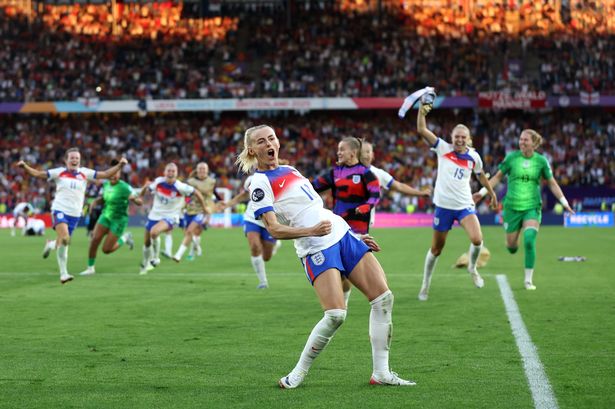The final whistle reverberated through Basel, marking not just the conclusion of an electrifying Women`s Euro tournament, but also, far more significantly, the initiation of a thrillingly unpredictable chapter in women`s football. While a prevailing sentiment, perhaps even an expectation, pointed towards Spain gracefully asserting their dominance with another championship, the narrative that unfolded proved strikingly different. England, the reigning champions, did not merely clinch victory; they redefined the blueprint for triumph, demonstrating with conviction that occasionally, the most captivating game is won through the most disciplined pragmatism.
The Tactical Chess Match: When Artistry Met Tenacity
Spain arrived in Switzerland adorned with the laurels of their recent Women`s World Cup success, revered for their intricate passing sequences and dynamic attacking prowess. Their progression to the Euro final was, by many measures, a clinic in possession-centric football. Yet, on the ultimate stage, they encountered an adversary resolute in prioritizing efficiency over spectacle. England, under the sagacious leadership of Sarina Wiegman, adopted a strategy that was, metaphorically speaking, less about a choreographed ballet and more about a strategic boxing match.
Wiegman`s Lionesses, eschewing their customary attacking exuberance, conceded possession, absorbed pressure with commendable discipline, and patiently carved out their opportunities. This approach was a calculated risk, an unglamorous counterpoint to Spain`s fluid artistry, and it yielded a resounding success. Mariona Caldentey`s early goal for Spain, an undeniable showcase of their inherent quality, would typically unnerve many teams. However, England, accustomed to falling behind – a recurring theme in four of their six Euro matches – exhibited a resilience that bordered on defiance. They were champions who embraced the role of the determined underdog with remarkable conviction, a subtle nod to the irony of the situation.
England`s Resilient Roar: From Adversity to Acclaim
The equalizer from Alessia Russo, a moment born of pure predatory instinct, significantly shifted the momentum. Yet, it was within the intense crucible of extra time, and subsequently the high-stakes penalty shootout, that England’s true character was emphatically displayed. Despite failing to register a single shot in 30 minutes of additional play, their defensive resolve, a characteristic often under scrutiny throughout the tournament, transformed into an unyielding barrier. Limiting Spain to a mere five shots on target from 22 attempts overall, and crucially, zero shots on target in extra time, underscored their newfound defensive cohesion.
Goalkeeper Hannah Hampton’s pivotal saves in the shootout, coupled with the exemplary performances from defenders Leah Williamson and Jess Carter (the latter delivering a particularly laudable, career-best display amidst recent personal challenges), embodied the unwavering grit that propelled England to their consecutive title. It was a victory not for the aesthetically inclined, nor for those who demand ceaseless attacking flair, but for a team that profoundly understood the often-stark realities of knockout tournament football: sometimes, triumph is forged through steadfast resilience, strategic patience, and perhaps, a timely stroke of fortune in a penalty shootout.
Spain`s Strategic Crossroads: The Limits of a Singular Approach?
For Spain, the defeat served as a stark revelation of a critical vulnerability. Their mesmerizing capacity to outpass and outscore opponents when game conditions favor them remains undeniable. However, the final exposed a perceived tactical inflexibility, a “one-note” orchestral performance that faltered when its rhythm was deliberately disrupted. England successfully coerced them into uncomfortable long balls, effectively dismantling their accustomed short-passing symphony. This observation is not intended to diminish Spain`s immense talent, but rather to underscore that even the world’s most formidable teams must cultivate a diverse tactical repertoire to overcome all challenges thrown their way.
The Shifting Power Dynamics: A Landscape of Productive Imperfection
This Women`s Euro unfolded as a compelling tapestry of surprises, ranging from Italy`s unexpected journey to the semifinals to the Netherlands` premature group stage exit. It painted a vivid picture of a sport actively transcending predictable hierarchies. The notion of any single team as an invincible, perpetual juggernaut has been thoroughly and refreshingly debunked. Power dynamics are unmistakably shifting, and the beautiful game, on the women`s side, is embracing a compelling and productive sense of imperfection.
The finalists themselves, England and Spain, for all their inherent strengths, openly showcased their respective vulnerabilities. This emergent parity, this shared human element of imperfection, is precisely what renders the sport so profoundly captivating. Record attendances and surging viewership figures unequivocally underscore an undeniable upward trajectory, creating the ideal environment for this captivating on-field fluidity and strategic unpredictability.
Gazing Towards 2027: The World Cup Beckons
As the echoes of England`s triumphant cheers gradually subside, the countdown to the 2027 Women`s World Cup, slated to be hosted in Brazil, officially commences. Had Spain claimed the Euro effortlessly, they might have stood as the undisputed favorites for the global showpiece. Now, they, alongside England and a cadre of other ambitious nations, form part of an extensive roster of “flawed champions” and serious contenders, each possessing significant scope for growth and tactical evolution.
The U.S. Women`s National Team, currently navigating its own generational transition, will be intensely focused on reasserting its historic dominance. Brazil, leveraging its role as host, will undoubtedly aspire to a landmark performance on home soil, eager to etch its mark on South America`s inaugural Women`s World Cup. The pressure is palpable, the stakes are exceptionally high, and the competitive landscape is notably open. Two years after the most fiercely contested World Cup in the history of the women`s game, the European Championship has powerfully reaffirmed a thrilling truth: women`s football is charting an undeniable course in the right direction, delivering a product that is competitive, compelling, and wonderfully, unpredictably, imperfect.

